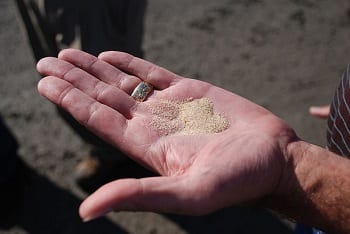For more hydrogen fuel cell news articles.
Researchers develop low cost thermal energy storage device that could store large amounts of power.
South Australian company, Latent Heat Storage, has developed a Thermal Energy Storage System dubbed TESS, a low-cost and highly scalable renewable energy storage device that is based on the latent heat properties of silicon derived from sand.
The TESS stores energy as thermal power and can be integrated anywhere within an electricity network.
How the device stores power as thermal energy is it heats and melts containers full of silicon. Silicon’s high latent heat capacity and melting temperature make it perfect for storing large amounts of energy.
Due to the fact that TESS is highly scalable and can be developed from small-scale 500 kW (kilowatt) applications to much larger scale applications of hundreds of megawatts that could power up to 7,000 homes a day, it can be integrated just about anywhere within an electricity network. This could make it particularly suitable for industrial and commercial businesses where both electricity and heat are required, such as schools, hotels, hospitals and nursing homes.
A viable renewable energy storage system is important to the future.
According to a press release posted by Energy Harvesting Journal, Latent Heat Storage CEO Jonathan Whalley said that “Renewable energy sources generally spill energy due to supply and demand mismatches, so we’ve designed the TESS device to capture this ‘spilt’ energy for later use or release to the grid.” Whalley added that “Our system also means that energy consumers will be able to purchase stored electricity off-peak at low tariffs.” Ultimately, what this means is that energy is cheaper.
TESS is suitable for grid or off-grid applications, according to the Latent Heat Storage website. The device has been created to overcome the “variable and intermittent nature” of renewable power sources, such as solar or wind energy, by providing an output of stable energy that is suitable for base load power.
The Thermal Energy Storage System has been developed in partnership with ammjohn, an Adelaide-based engineering consultancy, and engineering students at the University of Adelaide. The Australian Government has provided Latent Heat Storage with a $400,000 grant to take its device from prototype to commercial reality and this grant has been matched by the company’s shareholders, resulting in a total project funding of $800,000.
A commercial prototype of the renewable energy storage device is scheduled to be ready by early next year. Whalley said that instead of mass producing the systems, TESS devices will be built on an individual customer to customer basis to suit the needs of a specific site.
For more alternative energy news headlines today.